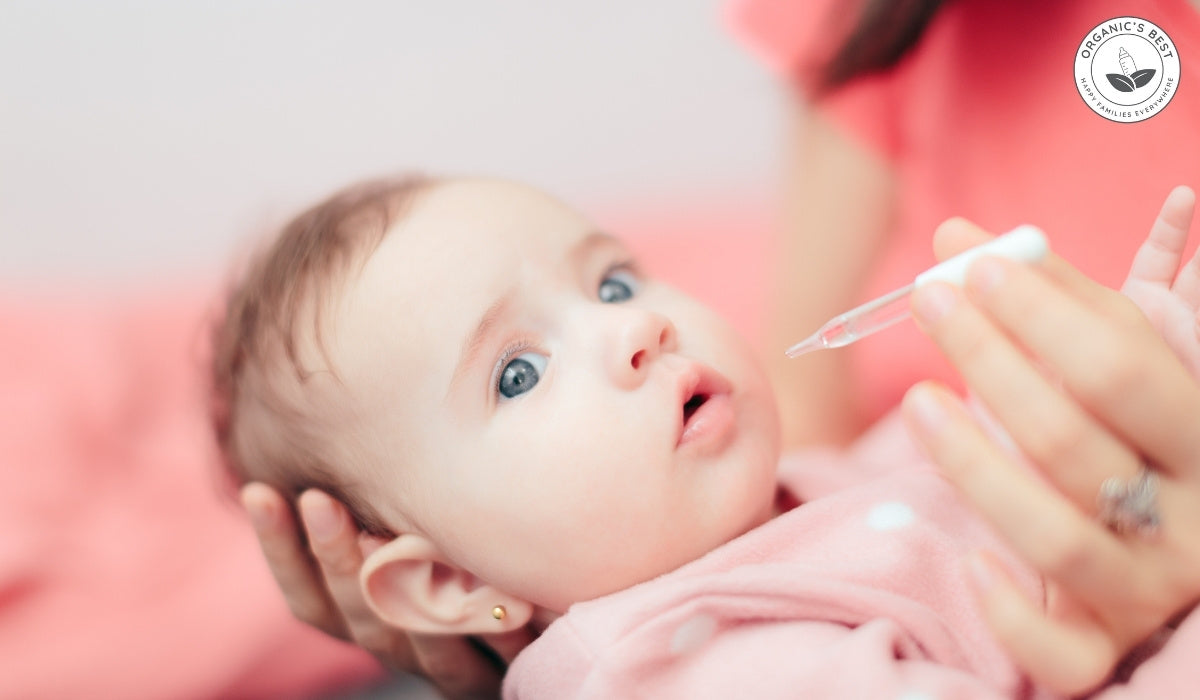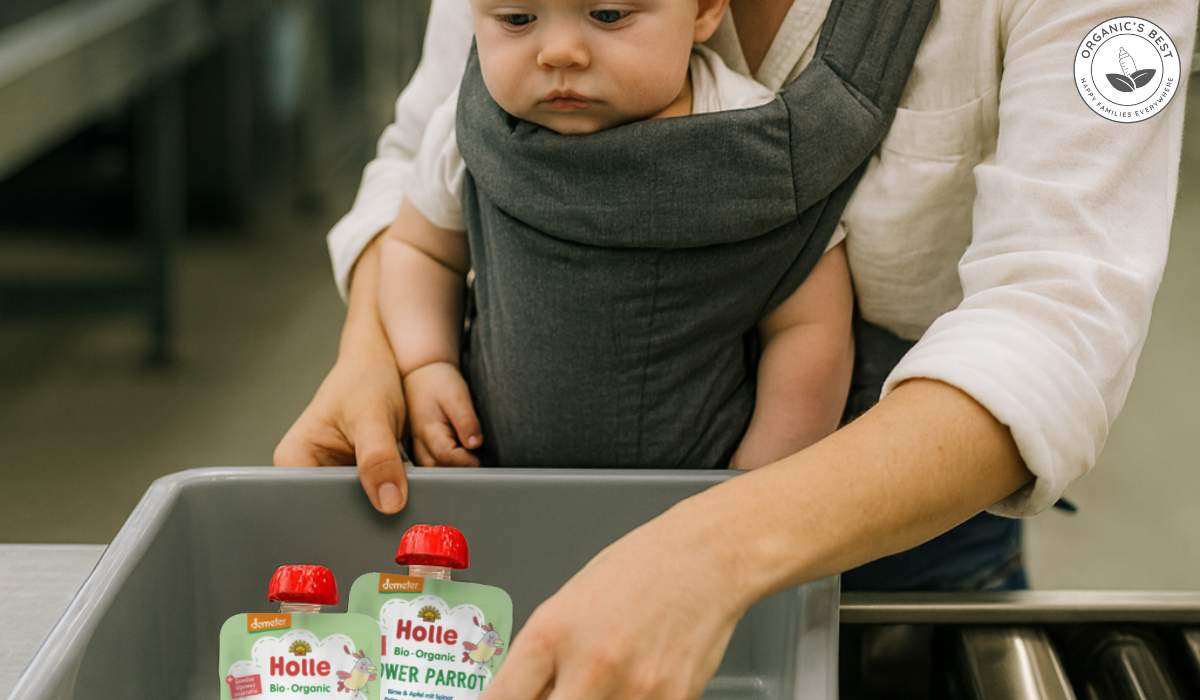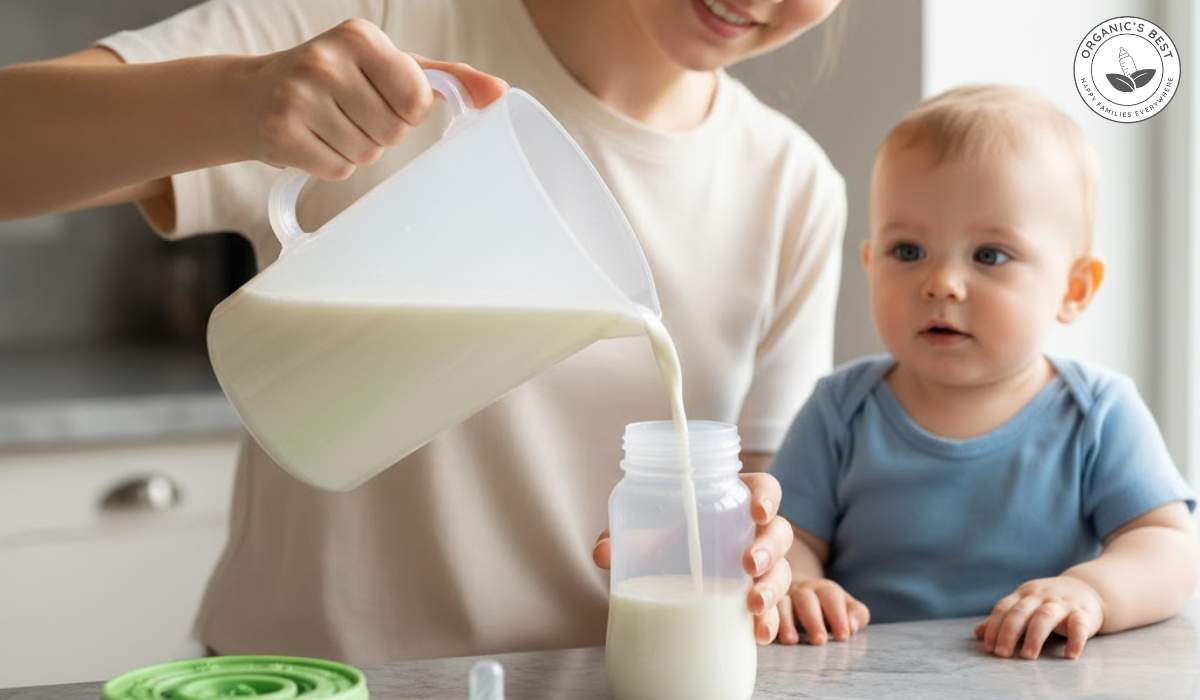Click to Get 2 FREE Boxes/Cans
Only New Customers! Click HERE to Get 2 Extra Boxes/Cans for Free With Your First Order.
BABY FORMULA
Offering new parents top-quality European infant formula from renowned brands like HiPP, Holle, Kendamil, and more. If you’re uncertain about which product to choose, our Formula Finder can help you make the best decision for your baby.
Baby Food
Offering new parents a premium selection of European baby foods, including jars, pouches, cereals, and snacks from esteemed brands like HiPP and Holle.
Essential Guide to Vitamin D for Babies
by Agustina Fernandez June 24, 2025 8 min read

Vitamin D is sometimes known as the "sunshine vitamin" because our bodies can produce it when exposed to sunlight, but for babies, especially those under six months, receiving an adequate amount of it gets a bit more complicated.
Whether breastfed or formula-fed, living in sunny climates or northern regions, many infants don't get enough vitamin D to meet their developmental needs. Yet, this vitamin is essential not just for strong bones and teeth, but also for supporting the immune system, regulating calcium levels, and even preventing chronic disease later in life.
In this guide, we'll break down everything parents need to know about vitamin D for babies, from why it matters to how to safely supplement, to signs of deficiency, and more.
Table of Contents
Importance of Vitamin D for Infants
Vitamin D might be a tiny nutrient found on a long list of formula ingredients, but it plays a big role in helping your baby grow strong and healthy. It's a fundamental part of the mechanics needed for building sturdy bones and strong teeth because it helps the body absorb calcium and phosphorus, two minerals that are essential for skeletal growth.
To prevent the negative outcomes associated with vitamin D deficiency, the American Academy of Pediatrics (AAP) recommends giving breastfed and partially breastfed babies a daily vitamin D supplement of 400 IU, starting within the first few days after birth.
That's because, while a mother's breast milk is full of amazing nutrients, it doesn't naturally have enough vitamin D, even if you eat a well-balanced diet. That being said, breast milk is still considered the optimal nourishment for infants, and the AAP recommends exclusive breastfeeding for roughly the first 6 months of your baby's life, followed by complementary foods for at least 2 years, as long as it's desired by you and your little one.
All babies need vitamin D, but it's especially important if:
-
Your baby is under 6 months old and not getting any sun exposure
-
You're breastfeeding and not using fortified formula
-
Your baby isn't getting much sunlight due to weather, lifestyle, or sun safety habits
An important fact to know about vitamin D is that it is stored in body fat, so it needs to be taken regularly to keep levels steady, which is why daily supplementation is often recommended.
And it does more than just support bones; it also helps power the immune system, keeping your little one protected from illness. Some studies even link healthy vitamin D levels to a lower risk of conditions like asthma, diabetes, and other chronic diseases later in life.
Role of Vitamin D During Pregnancy
A baby's vitamin D status doesn't start at birth; it begins in the womb. During pregnancy, a mother's vitamin D stores are passed directly to the baby, laying the foundation for healthy bone development, immune function, and calcium regulation before birth even happens.
According to research conducted by the Medical University of South Carolina, there is currently a "widespread deficiency of vitamin D throughout the world in pregnant women due to changes in lifestyle, access to sunlight, use of sunscreen, and minimal vitamin D content in a variety of diets."
If a pregnant woman is deficient in vitamin D, her baby is more likely to be born with low stores as well, putting the infant at higher risk of vitamin D deficiency in the first few months of life. Conversely, if a mother maintains adequate or high vitamin D levels during pregnancy, her baby will benefit from that nutritional head start.
Because of this, a pregnant woman should consult her healthcare provider to find out if she needs a higher dose during pregnancy. Some providers may recommend additional testing or tailored supplementation plans based on individual risk factors.
In addition to supplements, a balanced diet can help maintain vitamin D levels during pregnancy. Nutrient-rich foods such as those below can contribute to overall vitamin D intake, although diet alone may not meet all of the body's needs, especially when skin synthesis from sunlight is limited.
If you want to pump your diet full of Vitamin D, eat plenty of the following foods:

-
Fatty fish (like salmon, mackerel, sardines, and tuna)
-
Cod liver oil
-
Egg yolks
-
Fortified milk (cow's milk and some plant-based milks)
-
Fortified breakfast cereals
-
Fortified yogurt
Getting enough of this vitamin during pregnancy can also positively impact the pregnancy and birthing experience, as it helps lower the risk of issues like gestational diabetes, preeclampsia, and early delivery.
Beyond birth, vitamin D levels still matter, as breast milk is the main source of vitamin D for breastfeeding infants.
Vitamin D Deficiency in Babies: Signs and Solutions
Despite its importance, vitamin D deficiency remains one of the most common nutrient deficiencies in infants, especially during the first year of life, when growth and development happen at a rapid rate.
The signs of deficiency can range from subtle to severe. Some of the earliest symptoms might be easy to overlook, especially in young babies. These include:
-
Slowed growth or poor weight gain
-
Crankiness or unusual lethargy
-
Delayed motor milestones
If deficiency progresses, more serious complications can present, such as:
-
Tetany, a condition caused by low calcium levels, leading to muscle spasms or tremors
-
Rickets, a condition where the bones become soft and deformed
-
Seizures, due to dangerously low calcium
-
Heart issues, particularly related to muscle function
-
Bone deformities, including bowed legs or thickened wrists and ankles
While any baby can develop a deficiency, certain groups are at significantly higher risk:

-
Breastfed babies, particularly if their mother has low vitamin D levels. Since breast milk naturally contains very little vitamin D, supplementing vitamin D for breastfed babies is usually necessary.
-
Formula-fed babies, though at lower risk, these infants may still be vulnerable if they drink less than 32 ounces (approx. 1 liter) daily.
-
Babies with darker skin, because melanin reduces the skin's ability to produce vitamin D from sunlight.
-
Infants with limited sun exposure, due to living in northern climates, air pollution, frequent use of sunscreen, or clothing that covers most of the skin.
-
Babies with certain medical conditions, such as celiac disease, chronic kidney disease, or other disorders affecting fat absorption, which can interfere with vitamin D metabolism.
Now that we have talked about the signs of vitamin D deficiency, let's discuss how to treat it. The best way to prevent vitamin D deficiency in infants is through a daily vitamin D supplement.
Baby vitamin D drops, in particular, are frequently given to little ones, as they are easy to use and can be given directly or mixed into a bottle. Fortified foods can also help once solids are introduced. While sunlight also boosts vitamin D, it's not always safe or reliable, especially for babies under six months or those with darker skin.
While you may be hesitant to provide supplements early in your child's life, research shows that using a vitamin D supplement is safe, effective, and essential for preventing issues like rickets and poor growth. We suggest always talking to your pediatrician to find the right dose for your baby before introducing this to their diet.
What Are the Vitamin D Sources for Babies?
Babies can get vitamin D from several sources, though some are more reliable than others, and may be better suited at different stages of infant development.

Vitamin D Foods
Food sources like fatty fish, egg yolks, and fortified dairy products naturally contain vitamin D. However, these aren't a part of a baby's diet until later in infancy when weaning begins, making them unsuitable for the first few months when babies are exclusively breast or formula fed. However, vitamin D for toddlers is more easily acquired through food.
Vitamin D Baby Drops
Vitamin D drops for infants are the most dependable way to ensure babies get enough. These liquid supplements are easy to administer and are recommended for all breastfed babies from birth, and for formula-fed babies who don't meet the daily intake through formula alone.
Infant Formulas
Baby formulas are usually fortified with vitamin D and other vitamins for infants, but babies must consume at least 32 ounces per day to meet their needs through formula alone, something younger or smaller babies may not consistently do.
Sun Exposure
Sun exposure can help the body produce vitamin D naturally, but this comes with caution and should be done mindfully. Remember, babies have delicate skin, and direct sunlight isn't recommended for infants under six months, even though vitamin D for newborns is very important.
Those tiny tots with darker skin may also need longer exposure to synthesize enough vitamin D, which makes supplementation even more important.
Do Formula-Fed Babies Need Vitamin D Drops?
Vitamin D drops for babies may or may not be necessary when formula-fed, depending on how much formula they consume daily. Most infant formulas are fortified with this vitamin, and if a baby drinks about 32 ounces or more each day, they're likely meeting the recommended daily intake of 400 IU.
However, if your baby drinks less than that amount, especially in the early months, a Vitamin D supplement for babies is still recommended. Always check with your pediatrician to confirm whether drops are needed based on your baby's intake.
Do Breastfed Babies Need Vitamin D?
Yes, exclusively or partially breastfed babies need vitamin D drops starting soon after birth. Breast milk is a nutritional powerhouse, but it is naturally low in vitamin D, even if the breastfeeding parent is getting enough through diet or sunlight.
As mentioned above, to prevent deficiency and support healthy growth, the American Academy of Pediatrics recommends a daily supplement of 400 IU of vitamin D for all breastfed infants.
FAQs on Baby Vitamin D
Here's a brief summary of some of the most frequently asked questions covered in this article.
Is it Necessary to Give Vitamin D to Babies?
Yes, all babies need vitamin D. However, whether or not your baby needs a vitamin D supplement depends on how they're fed. Breastfed babies usually need one, while formula-fed babies may not, depending on how much they drink.
How Much Vitamin D Should Babies Take Per Day?
Babies who are breastfed or partially breastfed need 400 IU of liquid vitamin D each day, starting shortly after they're born. Formula-fed babies may also need a vitamin D supplement if they consume less than 32 ounces of fortified formula daily.
How Long Do Babies Need Vitamin D Drops?
Most babies need vitamin D drops throughout infancy, and possibly into toddlerhood, until they're regularly consuming fortified foods or getting safe sun exposure. Your pediatrician can help you decide when to stop.
Can Vitamin D Drops Cause Constipation in Babies?
It's rare, but some babies may experience mild gastrointestinal symptoms like constipation or gas. If you notice this after starting drops, talk to your provider about switching brands or adjusting the dose.
|
Disclaimer: Please be aware that this information is based on general trends in babies, and it is not medical advice. Your doctor should be your first source of information and advice when considering any changes to your child’s formula and when choosing your child’s formula. Always consult your pediatrician before making any decisions about your child’s diet or if you notice any changes in your child. Breastfeeding is the best nutrition for your baby because breast milk provides your child with all the essential nutrients they need for growth and development. Please consult your pediatrician if your child requires supplemental feeding. |
Agustina Fernandez
Dr. Agustina Fernandez earned her medical degree from the prestigious Universidad Nacional de Córdoba, Argentina. With a deep-rooted passion for pediatrics, Dr. Fernandez is currently on the path to specializing in children's healthcare. Recently, she has delved into the vital field of infant nutrition. Her research interests include breastfeeding, infant formula, and baby food in little ones’ formative years. Dr. Fernandez's commitment to this area of study underscores her dedication to ensuring the health and well-being of children from their earliest days.
Leave a comment
Comments will be approved before showing up.
Also in Organic Infant Nutrition and Health Blog

Everything You Need To Know About Winter Pregnancy: Essential Tips for Moms-to-be
by Agustina Fernandez December 16, 2025 8 min read
Read More
Can You Bring Baby Food Pouches on a Plane? Essential Tips for Parents
by Agustina Fernandez December 09, 2025 7 min read
Read More
The Formula Pitcher: Is It Safe To Make A Whole Pitcher Of Baby Formula?
by Agustina Fernandez December 02, 2025 8 min read
Read More